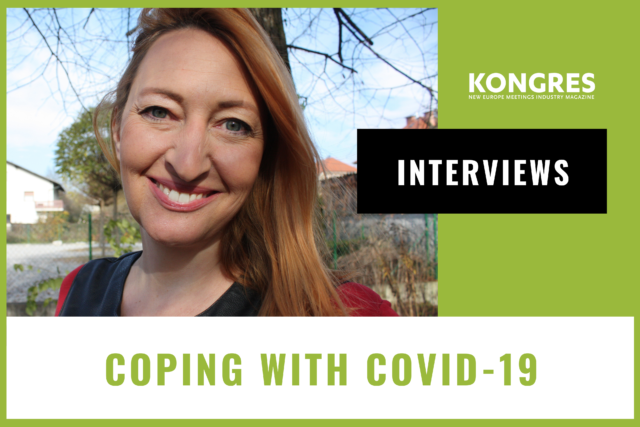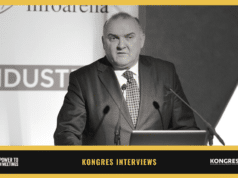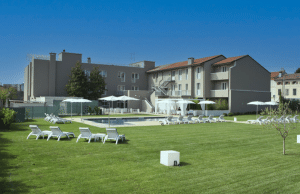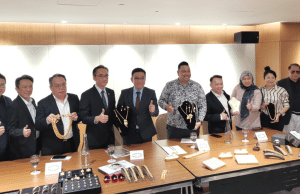In these challenging times, Kongres Magazine is trying its best to provide meeting planners with the most relevant and useful information regarding the spread of COVID-19. We also want to share opinions from key members of the meetings industry.
We asked key opinion makers from the meetings industry for their thoughts on the situation and how they are coping with COVID-19.
NATAŠA POTOČNIK, Creative Director & Experience Designer at Enigmarium® experiences & Axe Throwing Europe
IN TOUGH TIMES STAY PLAYFUL
Q: How do you feel about the restrictions that European governments have implemented to contain the spread of COVID-19?
We are following the directions and guidelines of the government and respecting the preventive measures to a T. Our escape room facilities all over Slovenia and Croatia are closed, as well as our axe throwing facility. We think that the government actions are effective, but we’d like to see the epidemiologists and government officials working hand in hand. Honest and clear, positive communication is needed. Perhaps for a role model, we can look to Taiwan, which has had great success – people trusted the government and wanted to cooperate. If we were to implement a similar model, perhaps such repressive measures would not be necessary at all. In general, citizens are very cooperative, so I would like to see more trust from the government towards our citizens – and more positive communication.
The entertainment sector in our region has been severely affected by the measures. We – and indeed most live entertainment enterprises – lost all our revenue sources overnight, and most of us have high rents to pay.
Q: What would you compare this situation to?
Deserted city streets, an invisible enemy and the fact that it all happened overnight are reminiscent of some post-apocalyptic scenario that we’d like to use in our escape room games.
Perhaps it is most comparable to the Chernobyl disaster: people were caught completely unexpected and by an invisible enemy – radiation – too. The government kept the situation a secret and hesitated to confess about what had happened for some time, and then they had to act urgently and swiftly. The key to success was to admit that things had gotten out of hand, clear and frank communication, a request for help and the involvement of experts from all over the world.
Q: Economic consequences for the meetings industry have already started to show, what do you expect government institutions to do?
First of all, it would be fair to take care of people – many employees have been left without income overnight while waiting workers are expected to receive reimbursements, but we should not forget about precarious workers, the self-employed in culture, non-profit organisations, students … The universal basic allowance for isolation and disabling times seems to be a good way, or a way introduced in Singapore, where they have possibly been the most effective at dealing with the (effects of the) virus. There, for example, people received 100 Singapore dollars for each day of isolation, no questions asked, no complicated forms, etc. Loan payments and interest charges have been frozen and taxes and social contributions have been written off during the epidemic.
We would also like to see rent reimbursements and quick, really affordable long-term, government-guaranteed loans. In Singapore, they have developed a bridging loan programme for tourism stakeholders with loans up to one million Singapore dollars, with a 5% annual interest rate. The government assumes an 80% loan risk.
P.S. Politicians in Singapore have even donated one month of their salaries for the benefit of medical staff and cleaners.
Q: What is your opinion on virtual meetings, as an alternative to live events?
The world will never be the same again. In times of isolation, many people who would have never used these methods will get used to holding meetings, making purchases and socialising online. However, the new knowledge will be retained as useful and I believe that many more meetings will take place online in the future. This will save a lot of time and costs. There will be more working from home. More online shopping. On the other hand, the need for socialising and live meetings will not be reduced, but it will be carefully chosen which events will be attended and who will go to them.
Q: What precautions/measures are you taking in your company?
We introduced these safety precautions when the coronavirus emerged in Europe (even before the government regulation):
- Escape rooms games (and axe throwing games) can be played in small groups of people. Booking in advance is mandatory.
- After every game, the surfaces are sanitised with disinfectant.
- After every game, we open the doors and windows to air out the space.
- The time slot between games is at least 2 hours to allow time for cleaning and airing out.
- Players have to wash their hands with soap and water (or disinfect them if not possible to wash) upon entering and once again before playing the game.
- Hand sanitiser is readily available in all spaces.
- The guidelines from the Ministry of Health and National Institute of Public Health (NIJZ) are being followed.
We were also communicating these recommendations for the players:
- Only healthy players should come. If you don’t feel well, stay at home.
- Wash your hands with soap and water – upon entering, prior to the game, after visiting toilets …
- Please use the available hand sanitiser at the facility.
- Cover your mouth and nose with a tissue or your sleeve when coughing or sneezing. Wash your hands. Do not touch your face, nose or mouth.
- Follow the guidelines from the Ministry of Health and National Institute of Public Health (NIJZ).
Since 16 March 2020, all of our facilities are closed by government regulation.
Q: What are your expectations regarding the duration of the crisis and when will the situation go back to normal?
I hope that after the 1st of May holidays, life will slowly return to our economy. Some shops will open, and domestic public transport will begin operating again. Entertainment businesses such as escape rooms or axe throwing facilities, venues, bars, restaurants, hotels and cinemas might slowly begin re-opening in June. I think that schools will remain closed until the new school year in September.
But regarding foreign travellers – who will be brave enough to travel to another country, where you don’t know about the level of their public health service? Perhaps the countries in which they will deal with the virus the most effectively will be back on track sooner – but on the other hand – will they open the doors for travellers coming from countries in which the virus is still active? I’m placing my bet on local visitors for this season…
Q: How are you tackling the event prohibition? What will the next few months look like for you?
We have closed our facilities in different cities in Slovenia and Croatia and have put our employees “on hold”. We have written polite pleas to landlords. Some of them were very understandable and we are very thankful that they are so empathetic. Unfortunately, that’s not by default. High rents are the biggest threats to our businesses which are located in the city centres, so we hope that the government will offer some refunds so that we’ll be able to survive.
But we haven’t lost hope. In only ten days (and nights!) we managed to create, design and launch the very first, completely new concept that was invented by our team: an ONLINE escape room game called OTOK (ISLAND) – escape game in your room. We have offered the game for free to our players and fans – every day for a week we send them one chapter, and the next day they have to unlock the next chapter with the code they’ve deciphered. We said it is our contribution so that people can stay at home easier.
Almost 3.500 players have signed up for the game in Slovenia and Croatia and it has been a huge success. We’ve acted socially responsibly to gain trust and loyalty. This only proves that we have to adapt as soon as possible. We also think that our players will not forget about us after this will end. It is incredibly touching to read their thank you letters. This proves gamification is an incredible tool for activating customers.
Q: What can we do to help our industry get back to its feet as soon as possible?
Our communication should be honest, transparent, authentic. We have to act socially responsibly. Safety first – We need to be 100 % transparent about which measures have we assured so that the visit to an entertainment facility is safe. Also, we have to adapt our communication – today, mobile-first is even more important than before.
Q: Are you foreseeing any problems for the meetings industry once the prohibition is lifted?
Since travelling could be a challenge for some time, I think the meeting industry will have to adapt. The sooner the better. There will be a lot of online meetings and conferences, or hybrid ones: a smaller crowd on location + mandatory video streaming for online visitors. The recordings will have to be available to watch in different time zones from all over the world.
A FEELING OF SAFETY AND TRUST WILL BE CRUCIAL
Q: What does this mean for events in the future? What will have to change?
A feeling of safety will be crucial. We’ll have to ensure more space. Smaller groups. Disinfected hotel rooms. Better ventilation and airing of the space. Outside events. Online events. But I think the most important is trust. If the people will trust you, they’ll visit. So, communication, communication, communication. Honest, open, truthful, authentic.
Q: Is marketing (digital marketing) in the duration of the pandemic sensible (and appropriate)?
That depends. If you are advertising an online event, go for it, that’s not only OK, it is necessary. But I see many escape room providers advertising their games these days – despite the fact they are closed. I don’t think that is fair towards other escape room providers – the only gain is a higher price for the keyword “Escape Room”. However, if you are offering an online escape room experience, of course, digital advertising is appropriate.
Q: What will happen after we’ve beaten the virus? How will you (re)start your marketing activities?
We hope that our visitors will return to our facilities since they will not have forgotten about us during the isolation. We’ll try to strengthen our relationships with our customers by providing free entertainment during the hardest days. As well, we are investing in building the community of our fans, so we think that we’ll get their attention by opening a brand-new escape game. Or two. These days at home, we’re developing another new concept…
Q: Are you in contact with colleagues from around the world? Have you talked about any potential solutions?
As the president of the Association of Escape Room Activities of Slovenia and one of the pioneers of this activity, I am in constant touch with escape room owners from all over the world. It’s funny that some UK and US escape room owners were in total denial a few weeks ago. We told them what measures they would likely have to follow in order to prepare and gave them instructions on how to vent and disinfect, but our posts did not get a lot of attention. Today, the situation is different, together we are trying to establish new safety standards for the time after the virus.
It was really touching when we received a letter from colleagues from China – they gave us the thumbs up and they said that the business is slowly recovering. People still want to play. They also told us everything about disinfection that they’ve learned and what kind of relief they’ve gotten from their government.














